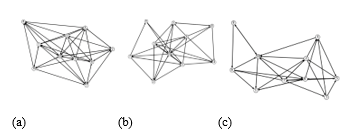Handling Concept Drift in Data Stream Mining of Event Logs Using Hybrid Optimization Algorithm
Keywords:
Fractional calculus, Improved Invasive weed optimization, event log, bounding model, truncated streaming, concept drift detectionAbstract
Process discovery is a method for attaining process scheme relies on traces exists in the event log. Today, information systems generate the streaming event logs to store their enormous processes. The truncated event log streaming is a challenging problem in process detection since it accuses an incomplete traces, which makes the inaccurate process in a process model. Several conventional techniques have been introduced for retrieving the truncated streaming of event log. This research proposes a method, namely Fractional Improved Invasive Lion Algorithm (FrIILA) for performing the concept drift handling on event log. For that, the event log data is processed under process dimension trimming using bounding model. Moreover, the process mining is carried out using developed FrIILA, which is deliberated by the integration of Fractional calculus (FC) and Improved Invasive Lion Algorithm (IILA). For the incremental data, the same processing is carried out for determining the process discovery. Here, the concept drift detection is carried out using two conditions, such as new event label and max min position of trace. The experimental outcome demonstrates that the devised method achieved better performance based on the replayability and precision of 98.01% and 80.39%.
Downloads
References
Bose, R.J.C., Van Der Aalst, W.M., Zˇliobaite˙, I. and Pechenizkiy, M., “Dealing with concept drifts in process mining”, IEEE transactions on neural networks and learning systems, vol.25, no.1, pp.154-171, 2013.
Tulilaulu, A., Paalasmaa, J., Waris, M. and Toivonen, H., “Sleep musicalization: Automatic music composition from sleep measurements”, In International Symposium on Intelligent Data Analysis, pp. 392-403, 2012.
Sarno, R. and Sungkono, K.R., “Recovering Truncated Streaming Event Log Using Coupled Hidden Markov Model”, International Journal of Pattern Recognition and Artificial Intelligence, vol.34, no.04, pp.2059012, 2020.
Martjushev, J., Bose, R.P. and Van Der Aalst, W.M., “Change point detection and dealing with gradual and multi-order dynamics in process mining”, In International Conference on Business Informatics Research, pp. 161-178, 2015.
Lu, J., Liu, A., Song, Y. and Zhang, G., “Data-driven decision support under concept drift in streamed big data”, Complex & Intelligent Systems, vol.6, no.1, pp.157-163, 2020.
Ancy, S. and Paulraj, D., “Handling imbalanced data with concept drift by ap- plying dynamic sampling and ensemble classification model”, Computer Communica- tions, vol.153, pp.553-560, 2020.
De Oliveira, H., Augusto, V., Jouaneton, B., Lamarsalle, L., Prodel, M. and Xie, X., “An optimization-based process mining approach for explainable classification of timed event logs”, In proceedings of 2020 IEEE 16th International Conference on Automation Science and Engineering (CASE), pp.43-48, August 2020.
W. M. P. van der Aalst, “Process Mining: Discovery, Conformance and Enhance- ment of Business Processes”, 2011.
Van Dongen BF, de Medeiros AK, Verbeek HM, Weijters AJ, van Der Aalst WM., “The ProM framework: A new era in process mining tool support”, In proceedings of International conference on application and theory of petri nets, pp.444-454, June 2005.
Gu¨nther CW, Van Der Aalst WM., “Fuzzy mining–adaptive process simplification based on multi-perspective metrics”, InInternational conference on business process management, pp. 328-343, September 2007.
Brockhoff, T., Uysal, M.S. and van der Aalst, W.M., “Time-aware concept drift detection using the earth mover’s distance”, In 2020 2nd International Conference on Process Mining (ICPM), pp. 33-40, 2020.
De Oliveira H, Augusto V, Jouaneton B, Lamarsalle L, Prodel M, Xie X., “Op- timal process mining of timed event logs”, Information Sciences, vol.528, pp.58-78, August 2020.
Prodel M, Augusto V, Jouaneton B, Lamarsalle L, Xie X., “Optimal process mining for large and complex event logs”, IEEE Transactions on Automation Science and Engineering, vol.15, no.33, pp.1309-25, January 2018.
Sun H, Liu W, Qi L, Du Y, Ren X, Liu X., “A process mining algorithm to mixed multiple-concurrency short-loop structures”, Information Sciences, vol.542, pp.453-75, January 2021.
Andrews R, van Dun CG, Wynn MT, Kratsch W, R¨oglinger MK, terHofstede AH., “Quality-informed semi-automated event log generation for process mining”, Decision Support Systems, vol.132, pp.113265, May 2020.
Misaghi M, Yaghoobi M., “Improved invasive weed optimization algorithm (IWO) based on chaos theory for optimal design of PID controller”, Journal of Computational Design and Engineering, vol.6, no.3, pp.284-95, July 2019.
Rajakumar BR., “Lion algorithm for standard and large scale bilinear system identification: a global optimization based on Lion’s social behavior”, In proceedings of 2014 IEEE congress on evolutionary computation (CEC), pp.2116-2123, July 2014.
Bhaladhare, P.R. and Jinwala, D.C, ”A clustering approach for the-diversity model in privacy preserving data mining using fractional calculus-bacterial foraging optimization algorithm,” Advances in Computer Engineering, 2014.
Zheng, C., Wen, L. and Wang, J., “Detecting process concept drifts from event logs. In OTM Confederated International Conferences” On the Move to Meaningful Internet Systems”, pp. 524-542, 2017.

Downloads
Published
How to Cite
Issue
Section
License

This work is licensed under a Creative Commons Attribution-ShareAlike 4.0 International License.
All papers should be submitted electronically. All submitted manuscripts must be original work that is not under submission at another journal or under consideration for publication in another form, such as a monograph or chapter of a book. Authors of submitted papers are obligated not to submit their paper for publication elsewhere until an editorial decision is rendered on their submission. Further, authors of accepted papers are prohibited from publishing the results in other publications that appear before the paper is published in the Journal unless they receive approval for doing so from the Editor-In-Chief.
IJISAE open access articles are licensed under a Creative Commons Attribution-ShareAlike 4.0 International License. This license lets the audience to give appropriate credit, provide a link to the license, and indicate if changes were made and if they remix, transform, or build upon the material, they must distribute contributions under the same license as the original.





